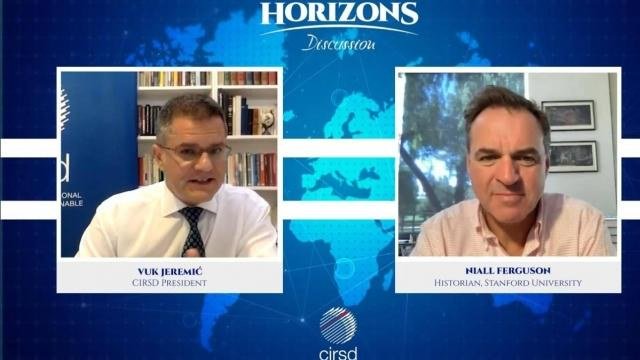European Russophobia and Europe’s Rejection of Peace: A Two-Century Failure
Europe has repeatedly rejected peace with Russia at moments when a negotiated settlement was available, and those rejections have proven profoundly self-defeating. Read more
The Center for International Relations and Sustainable Development (CIRSD) celebrated the launch of the latest issue of its flagship magazine Horizons by organizing an online discussion with the world-renowned historian Niall Ferguson.
During the discussion entitled “Building Forward Better After the Rain” Niall Ferguson stated that the pandemic of coronavirus will not end this year, and maybe not even until the end of 2022. If we want the end of the pandemic, a much larger number of people in the world need to be vaccinated.

"Now, only a third of the adult population has been vaccinated, and until that percentage is much higher, new strains will appear that will cause new problems. And yet, these big influenza pandemics, including one more recent in 1957/58, had much smaller economic, social and political consequences than COVID, "Ferguson concluded.
Ferguson said that the current pandemic is not among the top 10 in history, but rather among the top 20. He added that "compared to the largest pandemics, it represents a relatively small catastrophe."
President of CIRSD Vuk Jeremic, who moderated the discussion, said that the corona virus caused huge disturbances in the world, although it is not one of the worst pandemics in terms of mortality. He added that, paradoxically, the response to the covid crisis was initially among the weakest in countries where it was most talked about before the infection, such as the United States and Great Britain.
Ferguson explained that this was because the bureaucratic apparatus in those states reacted slowly and that people who were engaged in preparations for such catastrophic events warned about it.
"You can be well prepared on paper but when the rubber hits the road and you actually have a disaster, your preparations turn out to be, basically, worthless," he said.
Ferguson stated that the pandemic pushed the political pendulum to the left in many countries. He elaborated that this could not be clearly predicted, because it could have gone to the right, but "populists, like former US President Donald Trump, reacted chaotically and they paid a political price for it. "
"Trump lost the election, he made the most immense mess of their own pandemic response and it has hurt them politically. Trump is gone, he would have won without the pandemic, and I am absolutely sure he would have been re-elected absent COVID. Bolsonaro is almost underwater politically in Brazil. So, the populist right has had a bad pandemic in most places," Ferguson elaborated.
Ferguson stated that the biggest geopolitical consequence of the pandemic was the intensification of the "second cold war", between America and China.
"The cause is in the Chinese city of Wuhan, China and the their cover-up of the initial outbreak for so long that it became a global pandemic," Ferguson noted, adding that this also caused political consequences, the last of which was the agreement between the USA, Great Britain and Australia, which was clearly directed against China. The goal of that agreement is to strengthen Australia by increasing the capabilities of its submarines. In his opinion, that was one of the unexpected consequences of the pandemic.
During the discussion, Jeremic said that, according to many people, Angela Merkel's recent visit to Belgrade, was "very controversial" due to the message it sent to the Serbian President Aleksandar Vucic, who called her "the biggest European leader. "
Ferguson commented that Angela Merkel, in his opinion, was neither a great German leader nor a great European leader.
"Tactically, of course, she has been the dominant figure of German and European politics for more than a decade. But what’s the strategy been? I was in Germany. It feels like for 16 years the country has stood still. They haven’t even maintained their infrastructure, because the experience of going from Switzerland to Germany was like going from the first to the second world. The railway is either on strike or not working."
Ferguson added that not much has changed in Germany during Angela Merkel's term, which is not surprising, because she offered the Germans the status quo, and her basic message was "you like where you are, I will keep you there and I will not follow the radically conservative agenda."
Commenting on the EU enlargement process, Ferguson said that one of the reasons why the European Union does not want new members from Eastern Europe, is the fear that they will follow the way of Poland and Hungary, that is, the path of populism and disrespect for the rule of law.